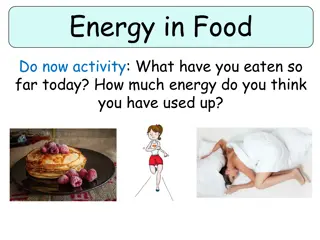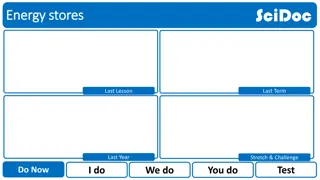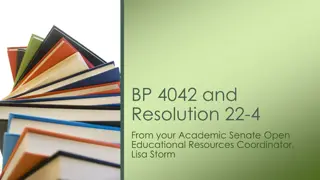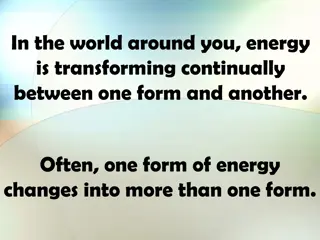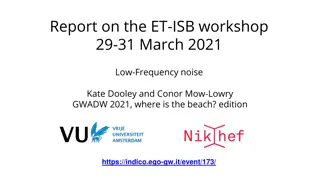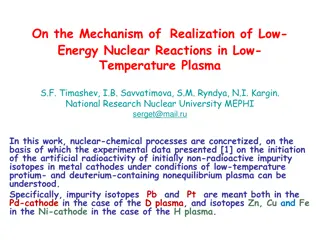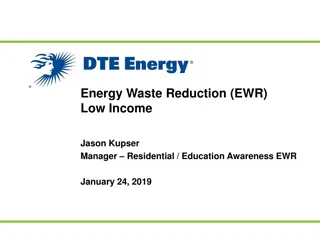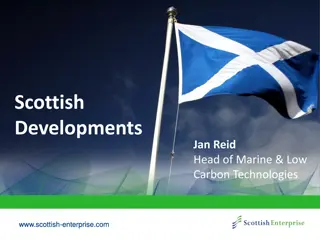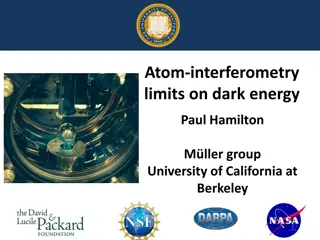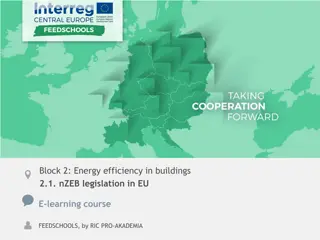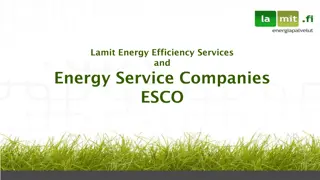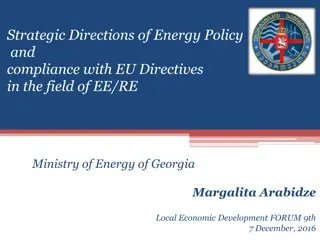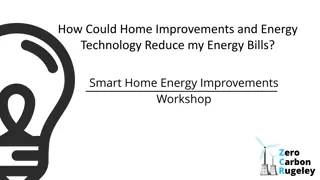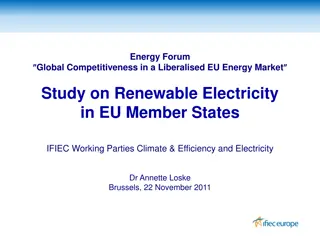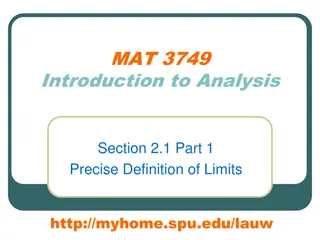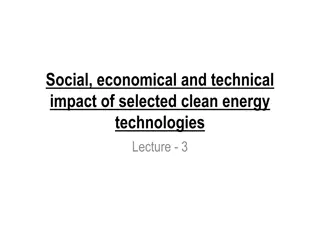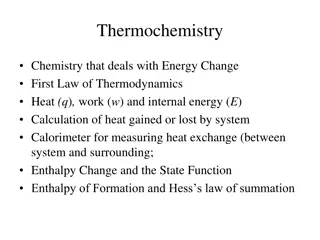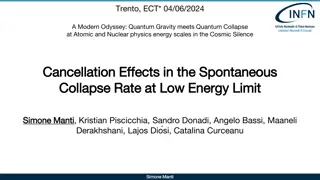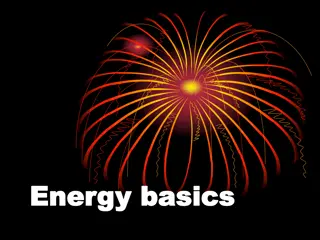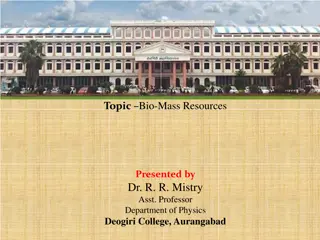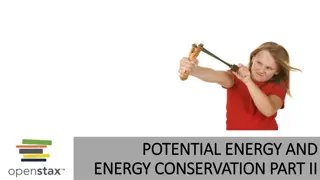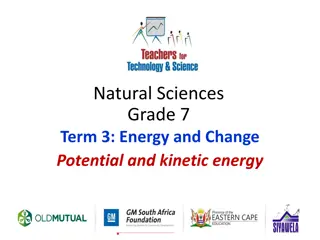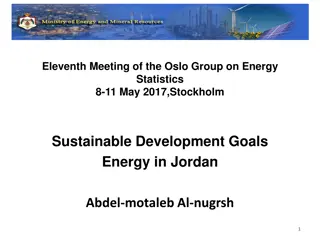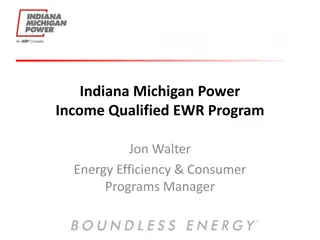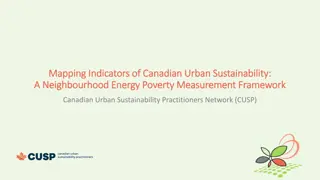Green Energy Market
Green energy also referred to as clean energy, is usually derived from natural sources that are constantly replenished. Solar energy, wind energy, hydroelectric power, biomass energy, geothermal energy, tidal energy, and wave energy are different types of renewable energy. Solar energy is the radian
5 views • 6 slides
Comprehensive Overview of Energy Balances in Germany
This material covers various aspects of energy balances in Germany, including components of energy flowcharts, renewable energy sources in the German energy balance, and total final consumption of road transport energy. It provides a detailed analysis of energy imports, domestic extraction, losses,
2 views • 10 slides
Understanding Energy: Types, Potential, and Kinetic
Dive into the world of energy with a comprehensive guide covering the definition, types, and characteristics of gravitational, potential, and kinetic energy. Explore how energy is the driving force behind all work and movement, with examples and explanations provided for each energy type. Gain insig
2 views • 24 slides
Sustainable Energy Initiatives at Local Level in Lithuania
The National Parliamentary Workshop on Energy Efficiency highlighted the importance of renewable energy development and sustainability at the local level in Lithuania. Initiatives such as the Breakthrough package and Renewable Energy Communities aim to improve energy efficiency, reduce energy povert
2 views • 12 slides
Explore Energy in Food and Daily Activities
Discover the relationship between energy in food and daily activities. Compare energy values of different foods, estimate daily energy intake, and analyze energy needs based on physical activities. Explore suitable foods for high energy requirements, and understand how to balance energy expenditure.
0 views • 14 slides
Exploring Energy Stores and Transfers in Science Lessons
Dive into the fascinating world of energy stores and transfers through engaging science lessons. Recall different energy stores, common energy transfers, and create flow diagrams to illustrate energy transfers in various scenarios. Explore gravitational, elastic, magnetic, electrostatic potential en
4 views • 9 slides
Academic Senate Resolutions and Low-Cost Thresholds in Higher Education
The Academic Senate addresses the adoption of open educational resources (OER) and low-cost materials to support academic freedom and compliance with legislative requirements. The resolution discusses the definition of low-cost resources and the variability among California Community Colleges in set
2 views • 9 slides
Energy Assistance Workshop Series Statewide Assessment
The Energy Assistance Workshop Series conducted a statewide assessment to understand energy burden and discuss utility energy assistance programs. The goal was to evaluate the effectiveness of mechanisms for energy assistance to prioritize households with higher energy burdens. The workshops aimed t
0 views • 26 slides
Empowering Women in Energy: SHE in Energy Africa Initiatives
SHE in Energy Africa is a non-profit organization dedicated to narrowing gender disparities, addressing skills shortages, and maximizing socio-economic benefits in the energy sector through skills development and training for girls and women. They aim to empower women with relevant knowledge and ski
4 views • 7 slides
Understanding Energy Transformation in the Natural World
Energy transformation occurs continuously in various forms around us, following the Law of Conservation of Energy. From thermal to chemical and electromagnetic energy, different types of energy are converted and utilized in everyday processes. Examples include the conversion of thermal energy to ele
0 views • 27 slides
Understanding Energy - Forms, Calculations, and Applications
Explore the concept of energy through various images, including forms of energy, kinetic versus potential energy, and calculations involving kinetic and potential energy. Learn about identifying energy states, calculating kinetic energy, and solving physics problems related to energy transfer. Dive
0 views • 27 slides
Understanding Energy Transfers with Sankey Diagrams
Sankey diagrams are visual tools that depict energy transfers within a system, offering insights into efficiency and energy distribution. By examining the width of arrows representing energy flow, one can analyze useful and wasted energy outputs. Inefficient systems show a disproportionate amount of
1 views • 9 slides
Insights from ET-ISB Workshop on Low-Frequency Noise and GWADW 2021
The ET Instrument Science Board held a workshop focusing on addressing key challenges related to low-frequency noise in gravitational wave detectors. Experts discussed topics such as mirror temperature, dealing with low-frequency noise realities, and facility limits. The workshop highlighted the sig
0 views • 13 slides
Mechanism of Low-Energy Nuclear Reactions in Low-Temperature Plasma
This work discusses nuclear-chemical processes underlying low-energy nuclear reactions in low-temperature plasma environments, focusing on the initiation of artificial radioactivity in metal cathodes under protium- and deuterium-containing nonequilibrium plasma conditions. The role of electrons with
4 views • 6 slides
Energy Waste Reduction (EWR) Low Income Program Overview
The Energy Waste Reduction (EWR) Low Income program by DTE Energy aims to reduce energy use for low-income households through various cost-effective measures. The program includes assistance for single-family homes and multifamily buildings, home energy consultations, and behavioral reports. Despite
1 views • 15 slides
Conducting an Effective School Energy Audit
Performing an energy audit at a school helps in understanding energy usage patterns, identifying areas of waste, and creating energy-saving action plans. The audit involves collecting data, creating switch-off lists, and filling out templates methodically to track energy consumption. It should be do
0 views • 16 slides
Scottish Energy Developments and Innovation in Marine and Low Carbon Technologies
Scotland's energy sector is pioneering climate-friendly initiatives towards decarbonization by 2030. The focus lies on supporting renewable energy sources, enhancing energy system flexibility, efficiency, and resilience, and promoting the marine sector's advancements in tidal energy projects. The co
0 views • 11 slides
Limits on Dark Energy Using Atom Interferometry - UC Berkeley Study
Research conducted by Paul Hamilton Müller's group at the University of California, Berkeley, focuses on using atom interferometry to explore dark energy. The study delves into screened scalar fields as dark energy, future reach with atom interferometry, known unknowns related to dark energy densit
0 views • 39 slides
Understanding EU Legislation and Energy Efficiency in Buildings
This module explores the EU legislation and energy efficiency in buildings with a focus on Nearly Zero Energy Building (nZEB) concepts. It covers the importance of increasing energy efficiency in buildings in the EU, showcasing statistics on energy consumption and CO2 emissions. By improving energy
1 views • 23 slides
Innovative Approaches to Reach Low-Income Multifamily Tenants
This presentation explores creative strategies for engaging low-income multifamily tenants in energy efficiency programs. It discusses unique utility approaches from Michigan, Arkansas, and Colorado, highlighting best practices and lessons learned. The focus is on programs by Consumers Energy, Enter
0 views • 24 slides
Understanding Different Forms of Energy and Work in Physics
Energy in physics is the capacity to do work, and there are various forms of energy such as radiant energy, kinetic energy, gravitational potential energy, elastic potential energy, chemical potential energy, nuclear potential energy, electrical potential energy, thermal energy, and sound energy. Ea
0 views • 47 slides
Understanding the Green Deal Scheme for Energy Efficiency in the UK
The Green Deal is a national retrofit energy efficiency scheme introduced in the UK under the Energy Act 2011. It aims to provide energy efficiency measures to homes and businesses through loans collected via energy savings. Accredited advisers, installers, and providers play key roles in assessing
0 views • 17 slides
Understanding Energy Service Companies (ESCOs) and Their Role in Energy Efficiency
Energy Service Companies (ESCOs) like Lamit offer a range of energy services, from implementing energy-efficiency projects to renewable energy solutions. These companies work as long-term energy management partners, focusing on understanding customer needs, providing energy-saving solutions, and gua
2 views • 18 slides
Overview of Energy Policy and Compliance with EU Directives in Georgia
Ministry of Energy in Georgia focuses on strategic directions for energy policy in alignment with EU directives. The Energy Strategy, Covenant of Mayors, and National Energy Efficiency Action Plan are key initiatives promoting energy efficiency and renewable energy. Projects include consultancy on s
0 views • 10 slides
Exploring Home Energy Improvements and Smart Technology for Energy Efficiency
Discover how home improvements and energy technology can significantly reduce energy bills. Join the Smart Home Energy Improvements Workshop in Zero Carbon Rugeley to explore approaches for sustainable energy production and usage at home. Learn about retrofitting, smart energy systems, and meet char
0 views • 20 slides
Analysis of Renewable Energy Policies in the Liberalised EU Energy Market
This study examines the global competitiveness of the energy forum in a liberalised EU energy market, focusing on renewable electricity in EU member states. It delves into the energy balance, political context regarding European climate targets, industry involvement, and the financial context of ren
0 views • 16 slides
Understanding Precise Definitions of Limits in Analysis
Delve into the precise definitions of limits in mathematical analysis, exploring left-hand limits, right-hand limits, limit of a function, and more. Gain insights into how limits are defined and understood in the context of mathematical functions.
0 views • 28 slides
Designing a Novel Low-Energy Beamline for NA61/SHINE at CERN
Carlo A. Mussolini from the University of Oxford, working at CERN, is designing a new low-energy beamline for NA61/SHINE experiment. The need for a low-energy beamline arises from the lack of particle production data in the 1-13 GeV/c momentum range. Current beam facilities at CERN face challenges w
0 views • 24 slides
Social, Economical, and Technical Impact of Clean Energy Technologies
This course covers the management of micro-level clean energy projects, emphasizing the social, economic, and technical impacts of selected clean energy technologies. It discusses project organization, tools, project life cycle, financial analysis, barriers, capacity building, and more. It delves in
0 views • 32 slides
Basics of Thermochemistry and Energy Changes in Chemistry
Thermochemistry in chemistry involves energy change, the First Law of Thermodynamics, and concepts like heat, work, and internal energy. It explores calculations of heat exchange using calorimeters, Enthalpy Change, Enthalpy of Formation, and more. Energy basics cover the importance of energy change
0 views • 53 slides
Investigating Quantum Collapse and Spontaneous Radiation at Low Energy Scales
Delve into the realm where Quantum Gravity meets Quantum Collapse, exploring the Cosmic Silence Cancellation Effects and the Spontaneous Collapse Rate at Low Energy Limits. Models like Continuous Spontaneous Localization and Dio.si-Penrose propose solutions to the macroscopic observation challenge i
0 views • 20 slides
Understanding Revenue Limits and Calculation Process in School Financial Management
This educational material covers topics such as revenue limits, the components within revenue limits, what falls outside of the revenue limit, and a four-step process for revenue limit calculation in the context of school financial management. It includes detailed information on the regulation of re
0 views • 34 slides
Understanding Energy Basics: Temperature, Heat, and Transfer
Explore the fundamental concepts of energy, including temperature, heat, and energy transfer. Learn how temperature differs from heat, how they are measured, and the relationship between thermal energy and water volume. Discover the role of chemical energy and sound energy, and how energy is transfo
0 views • 12 slides
Biomass Resources: A Sustainable Energy Source Explored by Dr. R. R. Mistry
Biomass, as presented by Dr. R. R. Mistry, consists of various resources such as trees, cultivated plants, algae, urban waste, and rural waste, which play a crucial role in generating energy through photosynthesis. The conversion of solar energy into biomass energy is primarily achieved through this
0 views • 20 slides
Understanding Elastic Potential Energy and Energy Conservation Principles
Elastic potential energy is stored in elastic bodies like springs and is vital in understanding energy conservation principles. This energy can be calculated using the work done by an ideal spring on a block. By applying elastic potential energy concepts, one can analyze scenarios where a spring sys
0 views • 9 slides
Understanding Energy: Potential and Kinetic Forms in Grade 7 Natural Sciences
Energy in various forms is explored in Grade 7 Natural Sciences, with a focus on potential and kinetic energy. Energy is the ability to do work and exists in different types like heat, chemical, electromagnetic, nuclear, and mechanical. The sun serves as a primary energy source. Potential energy is
0 views • 11 slides
Energy Strategy and Challenges in Jordan: Towards Sustainable Development
The Eleventh Meeting of the Oslo Group on Energy Statistics discussed the energy sector in Jordan, highlighting challenges such as population growth, energy demand, and high energy costs. Jordan aims to diversify energy resources, reduce oil dependency, and enhance environmental protection through i
0 views • 34 slides
Understanding Confidence Limits in Statistical Analysis
Confidence limits are a crucial concept in statistical analysis, representing the upper and lower boundaries of confidence intervals. They provide a range of values around a sample statistic within which the true parameter is expected to lie with a certain probability. By calculating these limits, r
0 views • 4 slides
Indiana Michigan Power Income Qualified Program Overview
The Indiana Michigan Power Income Qualified Program, led by Jon Walter, focuses on reducing electrical energy consumption through various strategies such as providing energy-saving measures, home shell improvements, and weatherization enhancements. The program aims to educate residential customers o
0 views • 19 slides
Mapping Indicators of Canadian Urban Sustainability: A Framework for Neighborhood Energy Poverty Measurement
The Canadian Urban Sustainability Practitioners Network (CUSP) is implementing a project to reduce energy poverty through local clean energy access programs. The project aims to achieve energy and emissions goals, transition to clean energy, and benefit low/moderate-income households. By utilizing a
0 views • 24 slides




